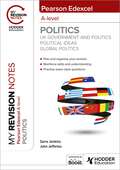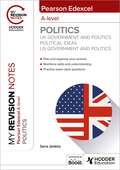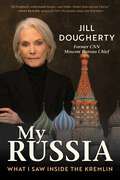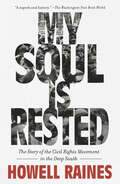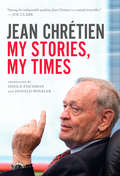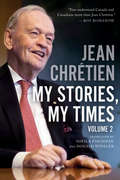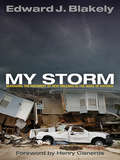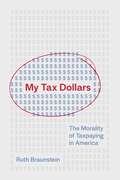- Table View
- List View
My Revision Notes: Uk Government And Politics, Political Ideas And Global Politics
by John Jefferies Sarra JenkinsMy Revision Notes will engage students with our updated approach to consolidating course content and helping them learn, practise and apply their skills and understanding. Coverage of key content is combined with practical study tips and effective planning strategies to create a guide that students can rely on to build both knowledge and confidence.- Helps students plan and manage their learning independently with our topic-by-topic planner- Encourages students to practise and apply their skills and knowledge with regular 'Now test yourself' sections, refreshed practice questions and answer guidance online- Supports subject-specific exam skills with a new exam skills box at the end of each chapter- Reflects the structure and format of recent exams with refreshed exam-style questions and improved course coverage- Includes content mapped to the specification, streamlined to give students the knowledge they need to help with the exams- Covers content for all three components of the Edexcel specification - UK Government and Politics, Political Ideas and Global Politics- Helps students understand key terms with user-friendly definitions and tips throughout, plus a glossary- Builds quick recall with bullet-pointed summaries at the end of each chapter, designed to reinforce knowledge and understanding
My Revision Notes: Uk Government And Politics, Political Ideas And Global Politics
by John Jefferies Sarra JenkinsMy Revision Notes will engage students with our updated approach to consolidating course content and helping them learn, practise and apply their skills and understanding. Coverage of key content is combined with practical study tips and effective planning strategies to create a guide that students can rely on to build both knowledge and confidence.- Helps students plan and manage their learning independently with our topic-by-topic planner- Encourages students to practise and apply their skills and knowledge with regular 'Now test yourself' sections, refreshed practice questions and answer guidance online- Supports subject-specific exam skills with a new exam skills box at the end of each chapter- Reflects the structure and format of recent exams with refreshed exam-style questions and improved course coverage- Includes content mapped to the specification, streamlined to give students the knowledge they need to help with the exams- Covers content for all three components of the Edexcel specification - UK Government and Politics, Political Ideas and Global Politics- Helps students understand key terms with user-friendly definitions and tips throughout, plus a glossary- Builds quick recall with bullet-pointed summaries at the end of each chapter, designed to reinforce knowledge and understanding
My Revision Notes: Uk Government And Politics, Political Ideas And Us Government And Politics
by Sarra JenkinsMy Revision Notes will engage students with our updated approach to consolidating course content and helping them learn, practise and apply their skills and understanding. Coverage of key content is combined with practical study tips and effective planning strategies to create a guide that students can rely on to build both knowledge and confidence.- Helps students plan and manage their learning independently with our topic-by-topic planner- Encourages students to practise and apply their skills and knowledge with regular 'Now test yourself' sections, refreshed practice questions and answer guidance online- Supports subject-specific exam skills with a new exam skills box at the end of each chapter- Reflects the structure and format of recent exams with refreshed exam-style questions and improved course coverage- Includes content mapped to the specification, streamlined to give students the knowledge they need to help with the exams- Covers content for all three components of the Edexcel specification - UK Government and Politics, Political Ideas and US Government and Politics- Helps students understand key terms with user-friendly definitions and tips throughout, plus a glossary- Builds quick recall with bullet-pointed summaries at the end of each chapter, designed to reinforce knowledge and understanding
My Revision Notes: Uk Government And Politics, Political Ideas And Us Government And Politics
by Sarra JenkinsMy Revision Notes will engage students with our updated approach to consolidating course content and helping them learn, practise and apply their skills and understanding. Coverage of key content is combined with practical study tips and effective planning strategies to create a guide that students can rely on to build both knowledge and confidence.- Helps students plan and manage their learning independently with our topic-by-topic planner- Encourages students to practise and apply their skills and knowledge with regular 'Now test yourself' sections, refreshed practice questions and answer guidance online- Supports subject-specific exam skills with a new exam skills box at the end of each chapter- Reflects the structure and format of recent exams with refreshed exam-style questions and improved course coverage- Includes content mapped to the specification, streamlined to give students the knowledge they need to help with the exams- Covers content for all three components of the Edexcel specification - UK Government and Politics, Political Ideas and US Government and Politics- Helps students understand key terms with user-friendly definitions and tips throughout, plus a glossary- Builds quick recall with bullet-pointed summaries at the end of each chapter, designed to reinforce knowledge and understanding
My Russia: The Political Autobiography of Gennady Zyuganov
by Gennady Zyuganov Vadim MedishGennady Andreevich Zyuganov is the leader of Russia's resurgent Communist Party and was Boris Yeltsin's strongest challenger in the summer 1996 presidential elections. Although his face became familiar to the world at that time, his ideas and his programme were mainly a subject of speculation. A former village teacher from Orel Province, Zyuganov came to Moscow in the 1980s to work in the ideology department of the Communist Party of the Soviet Union and to complete doctoral work in philosophy at Moscow State University. He is a prolific writer who has rebuilt the Communist Party on his vision of a Russian socialist great power. Today he leads the Communist faction in the Duma and is chairman of the united opposition movement - the National Patriotic Union. This volume is a compilation of Zyuganov's writings on Russia's past and present and her place in the world; Russia's fate under the new leadership of Gorbachev and Yeltsin; his own vision of Russia's future under a new Communist leadership; and his reflections on the 1996 presidential election of the Communist Party of the Russian Federation.
My Russia: War or Peace?
by Mikhail ShishkinIn his timely new book, Mikhail Shishkin, argues that Russia is not a 'riddle wrapped in a mystery inside an enigma': we just don't know enough about it. So what is the real story behind Putin's autocratic regime and its invasion of Ukraine?In My Russia: War or Peace? Shishkin traces the roots of Russia's problems, from the 'Kievan Rus' via the Grand Duchy of Moscow, empire, revolution and Cold War, to the now thirty-year-old Russian Federation. He explores the uneasy relationship between state and citizens, explains Russian attitudes to people's rights and democracy, and proposes that there are really two Russian peoples: the disillusioned and disaffected, who suffer from 'slave mentality', and those who embrace 'European' values and try to stand up to oppression.Both deeply personal and taking a broader historical view, My Russia is a passionate, eye-opening account of a state entangled in a complex and bloody past, as well as a love letter to a conflicted country. Will Russia continue its vicious circle of upheaval and autocracy, or will its people find a way out of history - and how can we help?
My Russia: War or Peace?
by Mikhail ShishkinIn his timely new book, Mikhail Shishkin, argues that Russia is not a 'riddle wrapped in a mystery inside an enigma': we just don't know enough about it. So what is the real story behind Putin's autocratic regime and its invasion of Ukraine?In My Russia: War or Peace? Shishkin traces the roots of Russia's problems, from the 'Kievan Rus' via the Grand Duchy of Moscow, empire, revolution and Cold War, to the now thirty-year-old Russian Federation. He explores the uneasy relationship between state and citizens, explains Russian attitudes to people's rights and democracy, and proposes that there are really two Russian peoples: the disillusioned and disaffected, who suffer from 'slave mentality', and those who embrace 'European' values and try to stand up to oppression.Both deeply personal and taking a broader historical view, My Russia is a passionate, eye-opening account of a state entangled in a complex and bloody past, as well as a love letter to a conflicted country. Will Russia continue its vicious circle of upheaval and autocracy, or will its people find a way out of history - and how can we help?
My Russia: What I Saw Inside the Kremlin
by Jill DoughertyMy Russia reveals CNN&’s Jill Dougherty&’s transformative journey from a Cold War-era obsession with Russia to witnessing firsthand the rise of Vladimir Putin and the unraveling of a nation she grew to love At the height of the Cold War, as a high school freshman, CNN&’s Jill Dougherty developed an obsession with Russia. Over the next half-century, she studied in Leningrad, traveled across the Soviet Union, lived in Moscow, and reported on the presidencies of Mikhail Gorbachev, Boris Yeltsin, and Vladimir Putin. Jill&’s life, and Putin&’s, intersected. They studied at the same Russian university; Jill was named CNN Moscow Bureau Chief just as Putin began his rise to power. She knew he was a former KGB officer, but she also believed he was an economic reformer. As Putin tightened his grip on the media, she changed her mind. In 2022, reporting from Moscow as Russian tanks rolled into Ukraine, she was convinced the leader with whom she once had sympathized was a tyrant threatening to destroy a country she had come to love. My Russia charts Russia&’s evolution through the eyes of an American with rare insight into Russia, its people, and its leaders.
My Secret Brexit Diary: A Glorious Illusion
by Michel BarnierIn June 2016, the people of the United Kingdom voted to leave the European Union. As the EU’s chief negotiator, for four years Michel Barnier had a seat at the table as the two sides thrashed out what ‘Brexit’ would really mean. The result would change Britain and Europe forever. During the 1600 days of complex and often acrimonious negotiations, Michel Barnier kept a secret diary. He recorded his private hopes and fears, and gave a blow-by-blow account as the negotiations oscillated between consensus and disagreement, transparency and lies. From Brussels to London, from Dublin to Nicosia, Michel Barnier’s secret diary lifts the lid on what really happened behind the scenes of one of the most high-stakes negotiations in modern history. The result is a unique testimony from the ultimate insider on the hidden world of Brexit and those who made it happen.
My Seditious Heart
by Arundhati RoyCollected essays and speeches from the bestselling, Booker-winning author of The Ministry of Utmost HappinessMy Seditious Heart collects the work of a two-decade period when Arundhati Roy devoted herself to the political essay as a way of opening up space for justice, rights, and freedoms in an increasingly hostile environment. Taken together, these essays trace her twenty year journey from the Booker Prize-winning The God of Small Things to the extraordinary The Ministry of Utmost Happiness: a journey marked by compassion, clarity, and courage. Radical and readable, they speak always in defence of the collective, of the individual, and of the land, in the face of the destructive logic of financial, social, religious, military, and governmental elites.In constant conversation with the themes and settings of her novels, the essays form a near-unbroken memoir of Arundhati Roy's journey as both a writer and a citizen, of both India and the world, from "The End of Imagination," which begins this book, to "Azadi," with which it ends.
My Seditious Heart: Collected Nonfiction
by Arundhati RoyTwo decades of commentary by the New York Times–bestselling author: &“An electrifying political essayist . . . uplifting . . . galvanizing.&” —Booklist From the Booker Prize-winning author of such works as The God of Small Things and The Ministry of Utmost Happiness, My Seditious Heart collects nonfiction spanning over twenty years and chronicles a battle for justice, rights, and freedoms in an increasingly hostile world. Taken together, these essays are told in a voice of unique spirit, marked by compassion, clarity, and courage. Radical and superbly readable, they speak always in defense of the collective, of the individual, and of the land, in the face of the destructive logic of financial, social, religious, military, and governmental elites. &“Her lucid and probing essays offer sharp insights on a range of matters, from crony capitalism and environmental depredation to the perils of nationalism and, in her most recent work, the insidiousness of the Hindu caste system. In an age of intellectual logrolling and mass-manufactured infotainment, she continues to offer bracing ways of seeing, thinking and feeling.&” —Pankaj Mishra, Time Magazine Praise for Arundhati Roy: &“Arundhati Roy combines her brilliant style as a novelist with her powerful commitment to social justice in producing these eloquent, penetrating essays.&” —Howard Zinn &“One of the most confident and original thinkers of our time.&” —Naomi Klein &“The scale of what Roy surveys is staggering. Her pointed indictment is devastating.&” —The New York Times Book Review
My Senator and Me: A Dog's-eye View of Washington, D.C.
by Edward M. KennedyThere's an old saying: "If you want a friend in Washington, get a dog." A few years ago, Senator Ted Kennedy decided to do just that. Now his dog, Champion Amigo's Seventh Wave (also known as Splash), is the most famous canine on Capitol Hill. Come follow Senator Kennedy and Splash through one whirlwind day in D.C.-from a press conference to a lunchtime game of fetch to a meeting with a school group to a vote on the Senate floor-as they work to pass an important law that will help schools across the United States. The warm, witty illustrations by Caldecott Medalist David Small offer a wonderful tour of the sights of Washington as well as an endearing portrait of the affection between man and dog. The result is a unique behind-the- scenes look at the life of one of the most energetic figures in American politics--and, of course, his very important owner.
My Side of the River: A Memoir
by Elizabeth Camarillo GutierrezA New York Times Editor's PickA People Magazine Best Book to Read in FebruaryA Goodreads Most Anticipated Book of 2024“My Side of the River is both fierce and poetic. It brilliantly reframes border writing while embracing nature and familial history. There are moments one sees greatness appear. This is one of those moments.” —Luis Alberto Urrea, New York Times bestselling author of Good Night, Irene Elizabeth Camarillo Gutierrez reveals her experience as the U.S. born daughter of immigrants and what happened when, at fifteen, her parents were forced back to Mexico in this captivating and tender memoir.Born to Mexican immigrants south of the Rillito River in Tucson, Arizona, Elizabeth had the world at her fingertips. She was preparing to enter her freshman year of high school as the number one student when suddenly, her own country took away the most important right a child has: the right to have a family. When her parents’ visas expired and they were forced to return to Mexico, Elizabeth was left responsible for her younger brother, as well as her education. Determined to break the cycle of being a “statistic,” she knew that even though her parents couldn’t stay, there was no way she could let go of the opportunities the U.S. could provide. Armed with only her passport and sheer teenage determination, Elizabeth became what her school would eventually describe as an unaccompanied homeless youth, one of thousands of underage victims affected by family separation due to broken immigration laws. For fans of Educated by Tara Westover and The Distance Between Us by Reyna Grande, My Side of the River explores separation, generational trauma, and the toll of the American dream. It’s also, at its core, a love story between a brother and a sister who, no matter the cost, is determined to make the pursuit of her brother’s dreams easier than it was for her.
My Sister’s Mother: A Memoir of War, Exile, and Stalin’s Siberia
by Donna Solecka UrbikasDonna Solecka Urbikas grew up in the Midwest during the golden years of the American century. But her Polish-born mother and half sister had endured dehumanizing conditions during World War II, as slave laborers in Siberia. War and exile created a profound bond between mother and older daughter, one that Donna would struggle to find with either of them.<P><P> In 1940, Janina Ślarzynska and her five-year-old daughter Mira were taken by Soviet secret police (NKVD) from their small family farm in eastern Poland and sent to Siberia with hundreds of thousands of others. So began their odyssey of hunger, disease, cunning survival, desperate escape across a continent, and new love amidst terrible circumstances.<P> But in the 1950s, baby boomer Donna yearns for a "normal" American family while Janina and Mira are haunted by the past. In this unforgettable memoir, Donna recounts her family history and her own survivor's story, finally understanding the damaged mother who had saved her sister.
My Soul is Rested: The Story of the Civil Rights Movement in the Deep South
by Howell Raines"A superb oral history." —The Washington Post Book World"So touching, so exhilarating...no book for a long time has left me so moved or so happy." —The New York Times Book ReviewThe almost unfathomable courage and the undying faith that propelled the Civil Rights Movement are brilliantly captured in these moving personal recollections. Here are the voices of leaders and followers, of ordinary people who became extraordinary in the face of turmoil and violence. From the Montgomery Bus Boycott in 1956 to the death of Martin Luther King, Jr., in 1968, these are the people who fought the epic battle: Rosa Parks, Andrew Young, Ralph Abernathy, Hosea Williams, Fannie Lou Hamer, and others, both black and white, who participated in sit-ins, Freedom Rides, voter drives, and campaigns for school and university integration.Here, too, are voices from the &“Down-Home Resistance&” that supported George Wallace, Bull Connor, and the &“traditions&” of the Old South—voices that conjure up the frightening terrain on which the battle was fought. My Soul Is Rested is a powerful document of social and political history, as well as a magnificent tribute to those who made history happen.
My Stories, My Times
by Jean Chretien Sheila Fischman Donald WinklerOne of the most popular Canadian prime ministers in recent history, elected to government for three consecutive majority terms, Jean Chrétien has some stories to tell. Recounted with warmth, insight and his distinctive sense of humour, these brief and candid essays feature many behind-the-scenes stories from a long, distinguished and colourful career. The book also features two sixteen-page colour photo inserts.October 2018 marks twenty-five years since Jean Chrétien took the helm as prime minister. In this collection of short essays, he has picked up his pen to reminisce about his long years in the public eye, and the many luminaries he met and worked with. Readers will learn why his commonsense judgment continues to influence our lives to this day, in ways both profound and subtle: from forging long-lasting relationships with foreign countries to making it easy to identify our national airline when we travel. He recalls a memorable trip with the royal family to the Northwest Territories in 1970, and how Ross Perot tried to influence his views on free trade in 1992. Of course, many familiar names figure in these stories, including George W. Bush, Boris Yeltsin, Tony Blair, Jacques Chirac, Pierre Trudeau, and Bill and Hillary Clinton. There are reflections on the many different posts over Chrétien's career, including becoming Canada's first-ever francophone finance minister. He pays tribute to old friends and colleagues, where the values of honour and dedication to public service transcend political views. He reserves his greatest admiration for his wife of more than sixty years, Aline, whom he calls his Rock of Gibraltar. These stories offer his unique perspective: we are at the Prime Minister's side on 9/11 when he is asked to give authorization to shoot down a passenger airliner that has not responded to identification requests. We learn how he attempted to correct the record as explained in his grandson's history book on the so-called "Night of the Long Knives." (Despite having special access to an eyewitness to history, his grandson got a failing grade on his paper.) There are even glimpses of the young Jean, as a teen canvassing with his father, and as a young man who dared complain personally to Premier Maurice Duplessis about the food at his seminary. Survival in politics requires stamina, creativity and toughness, as well as the ability to share a laugh now and again: qualities that the self-described "little guy from Shawinigan" never lost. In these days of "alternative facts" and politics-by-Tweet, these stories are a necessary antidote, told by a leader who always held fast to his vision of what Canada was and what it could be.
My Stories, My Times, Volume 2
by Jean ChretienFollowing on the heels of his bestselling collection of political reminiscences, former Canadian prime minister Jean Chrétien still has a few more stories to tell. With anecdotes and reflections both serious and light-hearted, My Stories, My Times, Volume 2 is a unique window on our country from one of its greatest statesmen and patriots. With a career that spanned decades and an active retirement after that, it should come as no surprise that Jean Chrétien&’s illuminating, perceptive and often humorous stories could not be contained in just one book. This collection of essays features his trademark candour and ever-sharp political acumen, with plenty of wit to accompany the wisdom. With a delightful randomness, he remembers events and personalities that shaped our nation in a multitude of ways, and offers his views on international current events, including Canada-China relations, Brexit, and interprovincial dealings. Jean Chrétien&’s stories serve to remind us that there is more to unite than divide us as a country, and that we have institutions we can take enormous pride in and values we must strive to maintain and keep building upon. Above all, these stories illustrate Jean Chrétien&’s firm belief that we must never cease searching for common ground despite our differences.
My Storm
by Edward J. Blakely Henry CisnerosEdward J. Blakely has been called upon to help rebuild after some of the worst disasters in recent American history, from the San Francisco Bay Area's 1989 Loma Prieta earthquake to the September 11 attacks in New York. Yet none of these jobs compared to the challenges he faced in his appointment by New Orleans Mayor Ray Nagin as Director of the Office of Recovery and Development Administration following Hurricane Katrina.In Katrina's wake, New Orleans and the Gulf Coast suffered a disaster of enormous proportions. Millions of pounds of water crushed the basic infrastructure of the city. A land area six times the size of Manhattan was flooded, destroying 200,000 homes and leaving most of New Orleans under water for 57 days. No American city had sustained that amount of destruction since the Civil War. But beneath the statistics lies a deeper truth: New Orleans had been in trouble well before the first levee broke, plagued with a declining population, crumbling infrastructure, ineffective government, and a failed school system. Katrina only made these existing problems worse. To Blakely, the challenge was not only to repair physical damage but also to reshape a city with a broken economy and a racially divided, socially fractured community.My Storm is a firsthand account of a critical sixteen months in the post-Katrina recovery process. It tells the story of Blakely's endeavor to transform the shell of a cherished American city into a city that could not only survive but thrive. He considers the recovery effort's successes and failures, candidly assessing the challenges at hand and the work done--admitting that he sometimes stumbled, especially in managing press relations. For Blakely, the story of the post-Katrina recovery contains lessons for all current and would-be planners and policy makers. It is, perhaps, a cautionary tale.
My Story
by Sarah Ferguson Jeff CoplonWhen Sarah Ferguson first surfaced as the woman Prince Andrew would marry, she was celebrated by the public as a breath of fresh air inside stuffy Buckingham Palace. But reality set in, and the very natural and candid Sarah became her own worst enemy. In MY STORY, Sarah looks back on her failed marriage and takes responsibility for her part in what went wrong.
My Struggle for Peace, Volume 1: The Diary of Moshe Sharett, 1953–1956 (The Diary of Moshe Sharett, 1953–1956 #1)
by Moshe SharettThe first volume of the former Israeli prime minister’s journals from the nation’s early years.My Struggle for Peace is a remarkable political document offering insights into the complex workings of the young Israeli political system, set against the backdrop of the disintegration of the country’s fragile armistice with the Arab states. Replete with Moshe Sharett’s candid comments on Israel’s first-generation leaders and world statesmen of the day, the diary also tells the dramatic human story of a political career cut short—the removal of an unusually sensitive, dedicated, and talented public servant. My Struggle for Peace is, above all, an intimate record of the decline of Sharett’s moderate approach and the rise of more “activist-militant” trends in Israeli society, culminating in the Suez/Sinai war of 1956. The diary challenges the popular narrative that Israel’s confrontation with its neighbors was unavoidable by offering daily evidence of Sharett’s statesmanship, moderation, diplomacy, and concern for Israel’s place in international affairs.This is the first volume in the 3-volume English abridgement of Sharett’s Yoman Ishi [Personal diary] (Ma’ariv, 1978) maintains the integrity, flavor, and impact of the 8-volume Hebrew original and includes additional documentary material that was not accessible at the time. The volumes are also available to purchase as a set or individually.“The editors . . . vastly improved on the Hebrew version by adding Sharett’s speeches, reports, cabinet minutes, and other sources to the text’. . . . These additions makes this work so important and welcome by all who aspire to understand the foreign and defense policies of Israel in its first decade.” —Israel Studies Review
My Struggle for Peace, Volume 2: The Diary of Moshe Sharett, 1953–1956 (The Diary of Moshe Sharett, 1953–1956 #2)
by Moshe SharettThe second volume of the former Israeli prime minister&’s journals from the nation&’s early years, centering on his time in office.My Struggle for Peace is a remarkable political document offering insights into the complex workings of the young Israeli political system, set against the backdrop of the disintegration of the country&’s fragile armistice with the Arab states. Replete with Moshe Sharett&’s candid comments on Israel&’s first-generation leaders and world statesmen of the day, the diary also tells the dramatic human story of a political career cut short—the removal of an unusually sensitive, dedicated, and talented public servant. My Struggle for Peace is, above all, an intimate record of the decline of Sharett&’s moderate approach and the rise of more &“activist-militant&” trends in Israeli society, culminating in the Suez/Sinai war of 1956. The diary challenges the popular narrative that Israel&’s confrontation with its neighbors was unavoidable by offering daily evidence of Sharett&’s statesmanship, moderation, diplomacy, and concern for Israel&’s place in international affairs. This is the second volume in the 3-volume English abridgement of Sharett&’s Yoman Ishi [Personal diary] (Ma&’ariv, 1978) maintains the integrity, flavor, and impact of the 8-volume Hebrew original and includes additional documentary material that was not accessible at the time. The volumes are also available to purchase as a set or individually.&“The editors . . . vastly improved on the Hebrew version by adding Sharett&’s speeches, reports, cabinet minutes, and other sources to the text. . . . These additions makes this work so important and welcome by all who aspire to understand the foreign and defense policies of Israel in its first decade.&” —Israel Studies Review
My Struggle for Peace, Volume 3: The Diary of Moshe Sharett, 1953–1956 (The Diary of Moshe Sharett, 1953–1956 #3)
by Moshe SharettThe third volume of the former Israeli prime minister&’s journals from the nation&’s early years.My Struggle for Peace is a remarkable political document offering insights into the complex workings of the young Israeli political system, set against the backdrop of the disintegration of the country&’s fragile armistice with the Arab states. Replete with Moshe Sharett&’s candid comments on Israel&’s first-generation leaders and world statesmen of the day, the diary also tells the dramatic human story of a political career cut short—the removal of an unusually sensitive, dedicated, and talented public servant. My Struggle for Peace is, above all, an intimate record of the decline of Sharett&’s moderate approach and the rise of more &“activist-militant&” trends in Israeli society, culminating in the Suez/Sinai war of 1956. The diary challenges the popular narrative that Israel&’s confrontation with its neighbors was unavoidable by offering daily evidence of Sharett&’s statesmanship, moderation, diplomacy, and concern for Israel&’s place in international affairs. This is the third volume in the 3-volume English abridgement of Sharett&’s Yoman Ishi [Personal diary] (Ma&’ariv, 1978) maintains the integrity, flavor, and impact of the 8-volume Hebrew original and includes additional documentary material that was not accessible at the time. The volumes are also available to purchase as a set or individually.&“The editors . . . vastly improved on the Hebrew version by adding Sharett&’s speeches, reports, cabinet minutes, and other sources to the text. . . . These additions makes this work so important and welcome by all who aspire to understand the foreign and defense policies of Israel in its first decade.&” —Israel Studies Review
My Struggle for Peace, Volume 3: The Diary of Moshe Sharett, 1953–1956 (The Diary of Moshe Sharett, 1953–1956)
by Moshe SharettThe third volume of the former Israeli prime minister&’s journals from the nation&’s early years.My Struggle for Peace is a remarkable political document offering insights into the complex workings of the young Israeli political system, set against the backdrop of the disintegration of the country&’s fragile armistice with the Arab states. Replete with Moshe Sharett&’s candid comments on Israel&’s first-generation leaders and world statesmen of the day, the diary also tells the dramatic human story of a political career cut short—the removal of an unusually sensitive, dedicated, and talented public servant. My Struggle for Peace is, above all, an intimate record of the decline of Sharett&’s moderate approach and the rise of more &“activist-militant&” trends in Israeli society, culminating in the Suez/Sinai war of 1956. The diary challenges the popular narrative that Israel&’s confrontation with its neighbors was unavoidable by offering daily evidence of Sharett&’s statesmanship, moderation, diplomacy, and concern for Israel&’s place in international affairs. This is the third volume in the 3-volume English abridgement of Sharett&’s Yoman Ishi [Personal diary] (Ma&’ariv, 1978) maintains the integrity, flavor, and impact of the 8-volume Hebrew original and includes additional documentary material that was not accessible at the time. The volumes are also available to purchase as a set or individually.&“The editors . . . vastly improved on the Hebrew version by adding Sharett&’s speeches, reports, cabinet minutes, and other sources to the text. . . . These additions makes this work so important and welcome by all who aspire to understand the foreign and defense policies of Israel in its first decade.&” —Israel Studies Review
My Tax Dollars: The Morality of Taxpaying in America
by Ruth BraunsteinWhen the mundane reality of paying taxes takes on moral significanceIn My Tax Dollars, Ruth Braunstein maps the contested moral landscape in which Americans experience and make sense of the tax system. Braunstein tells the stories of Americans who view taxpaying as more than a mundane chore: antigovernment tax defiers who challenge the legitimacy of the tax system, antiwar activists who resist the use of their taxes to fund war, antiabortion activists against &“taxpayer funded abortions,&” and a diverse group of people who promote taxpaying as a moral good.Though taxpaying is often portrayed as dull and technical, exposure to collective rituals, civic education, propaganda, and protest transforms the practice for many Americans into either a sacred rite of citizenship or a profane threat to what they hold dear. These sacred and profane meanings can apply to the act of taxpaying itself or to the specific uses of tax dollars. Despite intense disagreement about these meanings, politically diverse Americans engaged in both taxpaying and tax resistance valorize the individual taxpayer and &“my tax dollars.&”Braunstein explores the profound implications of this meaning making for tax consent, the legitimacy of the tax system, and citizens&’ broader understandings of their political relationships. Going beyond the usual focus on tax policy, Braunstein&’s innovative view of taxation through the lens of cultural sociology shows how citizens in value-diverse societies coalesce around shared visions of the sacred and fears of the profane.
My Ten Years as a Counterspy
by Boris Morros Charles SamuelsBoris Morros was a successful Hollywood producer and a highly regarded musician and impresario. His life had been a legendary success story even in the flamboyant annals of show business. What chain of events in 1936 led him into serving the interests of a Soviet spy ring? What even more dramatic events brought him into the office of the FBI in 1947 to take on the role of a United States counterspy? How did Morros manage to deceive Communist agents and help provide the evidence which resulted, in the exposure and conviction of the, leaders of the spy ring? This book, for the first time, unfolds the entire drama of the ten-year ordeal of Boris Morros.
